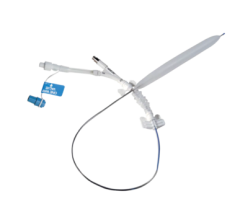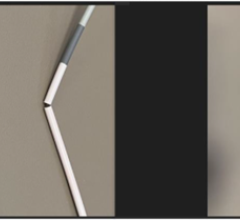
May 3, 2018 — The U.S. Food and Drug Administration (FDA) has expanded the indication for the Medtronic In.Pact Admiral Paclitaxel-coated Percutaneous Transluminal Angioplasty Balloon Catheter to include lesions up to 360 mm in length.
This device is indicated for percutaneous transluminal angioplasty, after appropriate vessel preparation, of de novo, restenotic, or in-stent restenotic lesions with lengths up to 360 mm in superficial femoral or popliteal arteries with reference vessel diameters of 4-7 mm.
The drug-coated balloon (DCB) helps re-open blocked or narrowed arteries in the thigh and knee due to peripheral artery disease (PAD). This device can be used to prevent re-narrowing within a stent placed previously to open the blood vessel or to treat long blockages. The balloon is coated on its outer surface with the drug paclitaxel, which is an anti-proliferative drug that prevents restenosis.
"Across SFA trials, In.Pact Admiral has consistently demonstrated superior safety and efficacy compared to PTA," said Osamu Iida, M.D., Kansai Rosai Hospital, Japan, during presnetation of data on the IN.PACT Admiral SFA Japan trial in February. "We are pleased to see comparable results in Japan at two years with durable patency outcomes, low TLR and no instances of thrombosis. There has been a critical unmet need in Japan for new technologies that safely and effectively treat PAD, and we believe In.Pact Admiral is well-positioned to meet this need."
IN.PACT Admiral SFA Japan demonstrated 79.8 percent primary patency in the DCB group as compared to 46.9 percent in the PTA group at two years based on Kaplan-Meier Estimate (p<0.001). The two-year results also demonstrated a CD-TLR rate of 9.1 percent for the DCB group compared to 20.7 percent in the PTA group (p=0.177) and a freedom from CD-TLR based on Kaplan-Meier Estimate of 90.8 for the DCB group compared to 81.3 percent in the PTA group (p=0.114). In IN.PACT SFA Japan, major adverse events were also lower for the DCB at two years (15.2 percent compared to 24.1 percent in the PTA group; p=0.384), with no major target limb amputations. There were no additional safety concerns at two years.
Read the recent article "In.Pact Admiral Balloon Demonstrates Consistent, Durable Outcomes in LINC 2018 Studies."
Here is the link to the FDA approval letter.
For more information: www.medtronic.com


 June 13, 2024
June 13, 2024 









